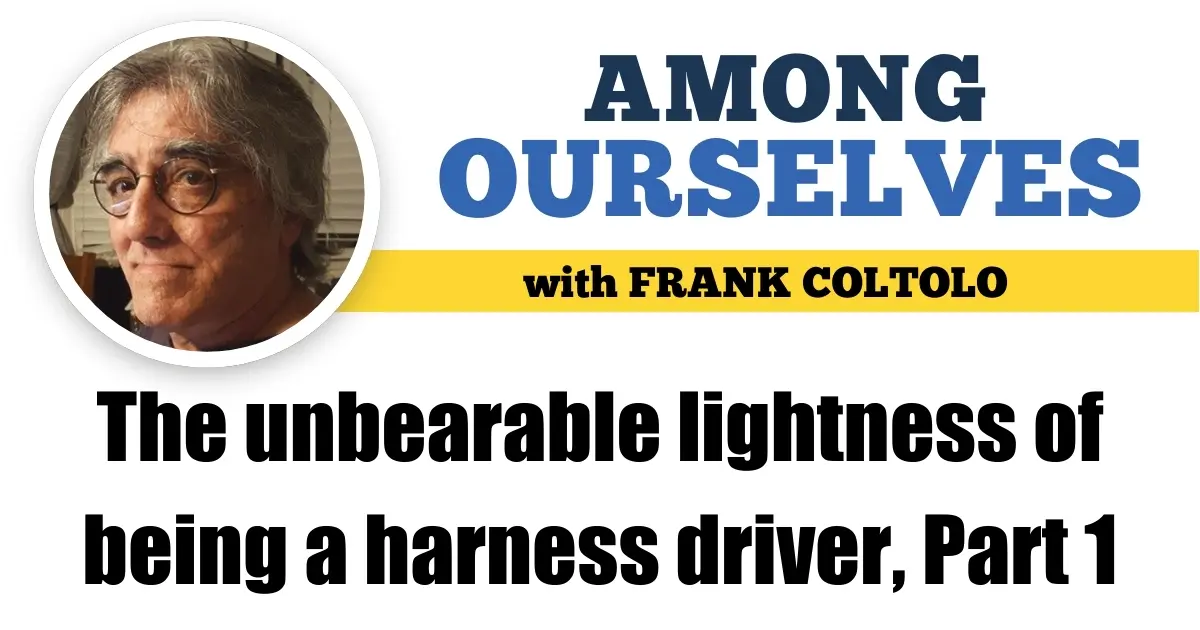The unbearable lightness of being a harness driver, Part 1
by Frank Cotolo
It does not take long once you are betting on standardbreds to become aware of the strong human element involved in their races. With such recognition novices reach an assumption that every harness horse in action is subordinate to the person holding the lines. Along with that misperception comes a cranky assumption that because the harness racing driver is able to manipulate the horse with great command then something corrupt is always in play. At least it was this way where I grew up learning about the sport.
The so-called wiser/veteran horseplayers said the standardbred pony’s pilot, riding in a “cart” makes the horse perform one way or another with little to no effort.
“It’s true a thousand times more for drivers than for jockeys,” I was told. And we believed it because our teachers said jockeys riding thoroughbreds were rarely, if ever dissed, for untoward behavior.
My Uncle Mike was well versed on the anti-driver talking points. “The real racing is with the runners,” he said.
“What about the night racing?” I said.
“That’s the harness guys. It’s fixed. Like wrestling.”
It was not so strange for young people to accept such statements in the late ’50s considering the spray of criminal indictments lower-middle-class men handed to institutions. This was not a healthy atmosphere to trust critical thinking. Facts were treated like any tens of guys mowed down by John Wick in a given action scene.
Damage was done. Perception overruled reality. The wagering public was lousy with cruel and unfair judgments of harness drivers’ performances. Bettors took it personal. After all, someone must be accountable for the broken strides and stressful duels and first-over moves and the other gazillion possible reasons one tears up a ticket.
And yet they laid down their dollars and bet and bet and bet some more. One guy at Roosevelt once told me how smart he felt when he cashed because he “figured out which horse’s turn to win it was.”
Another bettor said he bet the drivers not the horses. Consider a popular driver on the New York City circuit whom I will call Dan Delaney. A bettor said Delaney was, “one of the best drivers in harness racing because when he needed to come in second, he came in second.”
And losers continued to scream, “What a bum drive,” or “What kind of idiot pulls at the half,” or “If he’da whipped harder I’da cashed.”
And those were the polite examples of scorn from people who never dared get in a sulky with two-thousand pounds of equine flesh between their legs while their horse keeps a specific gait for a mile among tons of strapping steeds in the hands of other drivers.
It is a trope: a harness driver has rule over every move a horse makes in a race; their guilt for losing was so widespread it inspired pop-culture images earning a peculiar place in the house of movie parody.
A single scene here from National Lampoon’s 1983’s hit movie, “Easy Money,” was responsible for entrenching the satirical mimicry of harness racing drivers’ crooked reputations. This scene — though hilarious in its familiarity to east coast harness bettors — has done the single most damage to the sport than any actual harness racing scandal. In fact, it is only funny due to its perceived truth.
The driver’s corruption in the scene’s race is obviously burlesque. But Joe Pesci’s character’s reaction to it was the dream of crabby harness betting losers. Punish the driver with knuckle sandwiches. He is the guilty party. The previous scene showed the Pesci and Rodney Dangerfield characters battling crowd traffic at the betting windows. That scene shows the stressful betting atmosphere at the nighttime tracks.
As a fresh harness fan and bettor, I was critical of the cheap advice from the old hands. Like when one of them told me never to bet a horse driven by Russell Rash. I found profits doing the opposite because the tip was popular and I was able to cash Rash win tickets always in the double digits.
Also misleading were other handicapping tips.
“Never bet the 8 horse.”
“Bet every race and if you’re lucky you’ll break even.”
“Stay away from trotters. They always break.”
Every lesson was tinged with anger for drivers. No one ever mentioned the importance of equine talent. That is what made me pay attention to horse performances more than their drivers. I thought however true driver shenanigans affected a horse’s performance I would focus upon the horse’s ability. I found deep respect for whatever path it took to become a professional athlete and that made me confident to suppose all harness drivers were equal.
What happened? Successful bets followed when I began to profit from any driver bias.

















